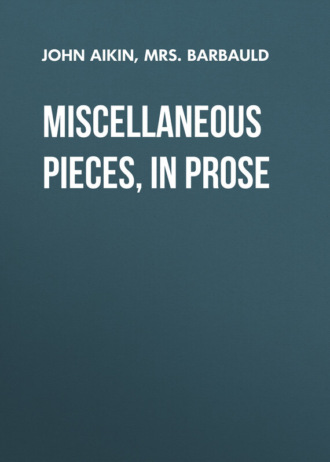 полная версия
полная версияMiscellaneous Pieces, in Prose
Thus have we seen that different modes of religion, though they bear little good-will to each other, are nevertheless mutually useful. Perhaps there is not an establishment so corrupt, as not to make the gross of mankind better than they would be without it. Perhaps there is not a sect so eccentric, but that it has set some one truth in the strongest light, or carried some one virtue, before neglected, to its utmost height, or loosened some obstinate and long-rooted prejudice. They answer their end; they die away; others spring up, and take their place. So the purer part of the element, continually drawn off from the mighty mass of waters, forms rivers, which, running in various directions, fertilize large countries; yet, always tending towards the ocean, every accession to their bulk or grandeur but precipitates their course, and hastens their re-union with the common reservoir from which they were separated.
In the mean time, the devout heart always finds associates suitable to its disposition, and the particular cast of its virtues; while the continual flux and reflux of opinions prevents the active principles from stagnating. There is an analogy between things material and immaterial. As, from some late experiments in philosophy it has been found, that the process of vegetation restores and purifies vitiated air; so does that moral and political ferment which accompanies the growth of new sects, communicate a kind of spirit and elasticity necessary to the vigour and health of the soul, but soon lost amidst the corrupted breath of an indiscriminate multitude.
There remains only to add, lest the preceding view of Sects and Establishments should in any degree be misapprehended, that it has nothing to do with the truth of opinions, and relates only to the influence which the adventitious circumstances attending them may have upon the manners and morals of their followers. It is therefore calculated to teach us candour, but not indifference. Large views of the moral polity of the world may serve to illustrate the providence of God in his different dispensations, but are not made to regulate our own individual conduct, which must conscientiously follow our own opinions and belief. We may see much good in an Establishment, the doctrines of which we cannot give our assent to without violating our integrity; we may respect the tendencies of a Sect, the tenets of which we utterly disapprove. We may think practices useful which we cannot adopt without hypocrisy. We may think all religions beneficial, and believe of one alone that it is true.
FINIS1
I am concerned to observe an instance of illiberal national ridicule without any merit of composition to palliate it, from a respectable dramatic writer, which is also rendered much more obnoxious by the circumstances. M. Voltaire’s Ecossaise was purposely written to exhibit a worthy English character; marked, indeed, with some whimsical peculiarities, but distinguished by a strong spirit of benevolence. It was impossible to expose national foibles more gently than by combining them with national virtues. When this Piece was brought on our stage under the title of the English Merchant, a French valet was inserted among the personæ dramatis, characterised by nothing but his false English, and for no other end but to be exhibited as a scoundrel!
2
Disc. on Poetical Imitation.

